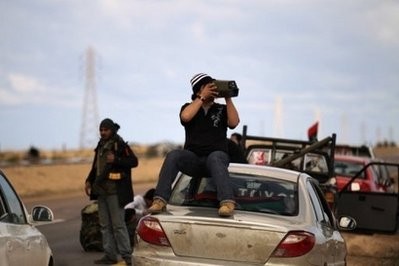Libyan leader Moamer Kadhafi defiantly claimed in TV comments aired on the fourth day of UN-backed military strikes on Libya that his country is "ready for battle," while Western leaders Wednesday planned their next steps.
We will win this battle," footage showed Kadhafi telling supporters at his Bab Al-Aziziyah compound in Tripoli that was the target of a coalition missile strike.
Early Wednesday, CNN reported that coalition airstrikes were launched overnight near the city of Misrata, east of Tripoli.

Rebels said Tuesday they had been under intense attack in their Misrata enclave, which has been besieged by Kadhafi's forces for weeks, with four children killed on Tuesday.
Meanwhile, US President Barack Obama, due in Washington on Wednesday after cutting short a Latin American trip, said he expected "clarity" on the future command structure of allied military operations "over the next several days."
Obama said there has been a "significant reduction" in US military flights over Libya as Western allies try to establish the UN-approved no-fly zone aimed at protecting Libyan civilians.
Fighting raged between forces loyal to Kadhafi and insurgents on Tuesday, and despite Kadhafi's boasts, there were reports the Libyan leader may be looking for a way out of the conflict.
US Secretary of State Hillary Clinton told ABC News that people close to Kadhafi have been contacting Libya's allies worldwide to see how they can "get out of this."
"We've heard about... people close to him reaching out to people that they know around the world -- Africa, the Middle East, Europe, North America, beyond -- saying what do we do? How do we get out of this?" she said.
Clinton added: "If there is a true opposition in Libya that is trying to assert itself, we're going to give them a much better chance than they had before the Security Council acted."
But as a senior US officer said Kadhafi forces were still attacking civilians, doubts persisted over the best way to continue the campaign to stop Kadhafi, and where it was leading.
Coalition forces, led by the United States, France and Britain and including some other European states and Arab country Qatar, are acting under UN Security Council resolution 1973 authorising "all necessary means" to protect civilians.
There is coordination but no unified command, and moves to hand over control of the operation to the North Atlantic Treaty Organisation are dividing the alliance.
Obama, French President Nicolas Sarkozy and British Prime Minister David Cameron agreed that NATO should play a key role in the command structure of the Libya mission, the White House said.
NATO ambassadors resumed talks on Tuesday after "very difficult" discussions on Monday which failed to overcome their divisions.
But a diplomat said they had agreed to use the organisation's naval power to enforce an arms embargo on Libya ordered under UN Resolution 1973.
Obama told a news conference in El Salvador that he believed that Washington will "fairly shortly" be able to say that the goal of imposing a no-fly zone in Libya had been reached.
"I have absolutely no doubt that we will be able to transfer the control of this operation to an international coalition," he added.
Destroying radar and missiles under Kadhafi's control would pave the way for a no-fly zone that could be patrolled by combat aircraft, with the United States assuming a supporting role, US Defense Secretary Robert Gates said in Moscow.
The Pentagon said Tuesday that the United States had flown 212 aerial missions against Libya, while coalition allies had conducted 124 such missions.
French Foreign Minister Alain Juppe said future actions of the coalition, which began air strikes on Saturday on Kadhafi military installations, depend in part on the embattled Libyan leader.
"The military operations could stop at any moment. All it would take is for the Tripoli regime to adhere precisely and completely with UN Security Council resolutions, and to accept a genuine ceasefire," Juppe said.
In reports of fighting Tuesday, residents of Yafran, 130 kilometres (80 miles) southwest of Tripoli, said at least nine people had been killed in clashes between the two sides.
But rebels also said they had managed to drive back loyalists and retake the outskirts of the western town of Zintan.
A standoff persisted in eastern Libya, where Kadhafi forces in and around Ajdabiya, south of the insurgents' capital of Benghazi, easily fought off attempts by the disorganised and ill-armed rebels to advance.
Obama warned Tuesday that Kadhafi may still hang onto power, but that a military approach was not the only way Washington can push for his ouster.
The embattled Libyan leader "may try to hunker down and wait it out, even in the face of a no-fly zone," Obama told CNN.
"But keep in mind that we don't just have military tools at our disposal in terms of accomplishing Kadhafi's leaving," he added.
Washington on Tuesday placed sanctions on 14 firms controlled by Libya's National Oil Corp, to cut off sources of funds for the Kadhafi regime.
World oil prices advanced: in New York, crude for April delivery closed at $104 dollars a barrel, up $1.67, while in London Brent North Sea crude for delivery in May rose 74 cents to $115.70.
Meanwhile, three journalists including two Agence France-Presse employees held by Kadhafi's forces since the weekend were released in Tripoli, an AFP journalist said early Wednesday. Dave Clark, Roberto Schmidt, and Getty photographer Joe Raedle had been arrested Saturday.
























